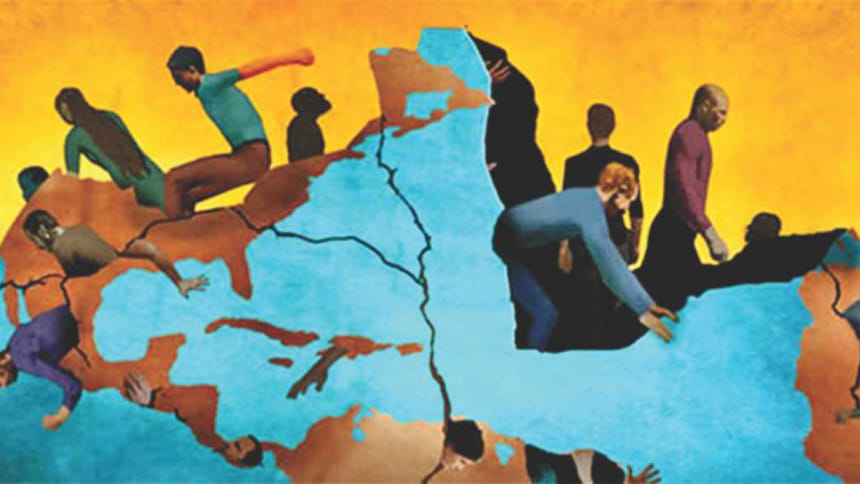Rethinking the population problem

With the knowledge that Bangladesh's population - which was about 75 million in 1971 - now stands bloated to more than 160 million, all crammed into a land area of only 50,260 sq miles and that the population density is already five times that in any other 'mega' country, contemplate the following scenarios and see if you want to picture the country with any further addition to its population. A population that renders running trains to become invisible under loads of humanity spilling out of their interiors and clinging to all over their exteriors, while carrying people to their homes in the countryside on the eve of Eids; traffic jams resulting into prolongation of say a 30-minute trip in the cities to an absurd three-hour trip; unbridled population increase that has already brought down the per capita land to 24 decimals or less and cultivable land to some 11 decimals; law courts reeling under the unwieldy burdens of hundreds of thousands of civil and criminal suits; innumerable daily occurrences of land-related disputes, countless crimes and murders; dying and moribund rivers; desertification and salinity intrusion from the sea; dire inadequacy of water supply causing distress to an enormous segment of the urban and rural population; a catastrophe from the rising sea-level looming large and threatening to submerge one-third of the land area of the country, which could thus engender the need to move and rehabilitate over 50 million internal migrants in the remaining two-thirds of the country's land territory, which could in turn raise the already high population density to an absurd level; fast-shrinking agricultural and cultivable land due to unplanned and uncontrolled urbanisation, industrialisation, infrastructural and development projects implementation; increasing cost of living, healthcare and education, and rampant and ubiquitous corruption and unscrupulousness; admission of even infants to schools depending on lottery and parents' capability to pay donations and; myriads of such other woes afflicting our daily life.
The root of nearly all our socioeconomic agonies can be traced back to the overpopulation of the country. Bangladesh's population has long ago exceeded the combined population of Myanmar, Thailand, Sri Lanka and Singapore. We do not have enough land even to properly house the existing population, let alone housing any additional people. All the strides and all the remarkable successes that Bangladesh has achieved in various socioeconomic sectors since its independence, and particularly under the present government since 2009, will be nullified if the population growth remains unbridled.
With population growth remaining unbridled, no government can implement development programmes and ensure their long-duration benefits to people. And with hundreds of thousands of young people joining the ranks of jobseekers every year, there is bound to be unmanageable unemployment problems and the resultant negative impact on the society. The world may not keep its doors wide open to perennially absorb our additional manpower and emigrants. There could be many impediments in the receiving countries, including racism and cultural repulsion.
During the first two decades after it came into being, Bangladesh was deemed by the West as a perfect example of a nation 'whose poverty was a direct consequence of over-breeding'. It was considered a basket-case that barely subsisted on handouts from rich and developed countries. Notable ecologists and leading biologists, like Garrett Hardin, wrote in The New York Times and scholarly journals, that all aids to Bangladesh should be ceased. Very few Bangladeshis were aware of those write-ups and they just occupied themselves resiliently with rebuilding their war-ravaged country. And belying all sinister predictions, today Bangladesh has graduated itself to a lower middle income country.
However, in order to sustain and further augment our socioeconomic progress, we urgently need a sound and effective population policy. We need to plan and regulate the growth of our population so as to avert any big addition to our already huge and absurd population. This small country is comparable to a perilously overloaded ferry that cannot simply accommodate any more passengers. We must not lose our rising living standards. We must not revert to the extreme poverty we had before and be known as a basket case again. We must not return to our pitiable square one and to the mercy of the international community. We certainly don't want that people of Garrett Hardin's sort to want to 'punish' us for over-breeding.
The government should recognise overpopulation as a priority issue. And in order to address it aptly, a permanent national council or body, comprising eminent demographers, efficient public officials, notable scholars, experts and planners, should be in place to advise the government on the actions to be taken in its bid to manage and regulate our population size, its growth, and its age groups composition, so that it does not show any further significant increase. At the same time, such measures can enable us to avert serious impacts of the ageing of our population on the size of our workforce, which should be as large as we may need.
It may be difficult to achieve and sustain that balance, but solutions to a complicated problem is never easy, although not unattainable. Uncontrolled and unmanaged population is already an existential threat to our nation. We cannot afford to paper over the problem and delay addressing it any more. Over-breeding of any particular species of animal or creature, even human beings, in a land tends to have an adverse impact on the ecology of that land. It upsets the ecological equilibrium and triggers natural cataclysms by over-exploitation of natural resources of the land and polluting its environment.
How can one imagine this little country of already teeming crores to have, say 25 crore people, in the future and still ensure decent lives for them? No government, for all its best intentions and efforts, has the power to do that if the population grows to such a ludicrous size. And every political party in the country, if it calls itself patriotic, must extend unstinting support to the government to forthwith adopt the strictest possible measures to control the growth and size of the population.
With growing cities, townships and urban centres across the whole country, Bangladesh is likely to become a huge city-state in about three decades from now, if the current rate of economic growth is sustained. That, however, will gluttonously swallow the country's invaluable agricultural land, unless we determine the minimum amount of it that we must unwaveringly protect to ensure food security in times of global food shortage, akin to what we witnessed in 2008.
While many of our neighbours are doing extremely well, progressing and consolidating their progress, we cannot live under the shadow of an existential threat due to the still growing overpopulation. Even our immediate neighbor, Myanmar, under its nascent and still shaky democracy, is showing great promise. In FY2015-2016, Myanmar received an FDI of US$9 billion. The total amount of the FDI received by Myanmar from 1988 to 2015 was around US$60 billion. And the country is expected to attain an economic growth rate of 8.4 percent in the current fiscal year (April 2016 - March 2017). Territorially, Myanmar is more than 4.5 times larger than Bangladesh, with an area equal to about half the country under rich forests. It has natural resources of all kinds, including gems, valuable minerals, oil, and offshore natural gas reserves estimated at 10 trillion cubic feet as well as huge areas of rice producing fertile agricultural land. Yet, it has a population of around 50 million, i.e. less than one-third of the population of Bangladesh. I strongly feel that Bangladesh must keep pace with its neighbours in the matter of progress in socioeconomic areas and other spheres. Bangladesh needs to sustain the progress it has attained so far and achieve more. There cannot be any falling back to our past.
The writer is a former Ambassador and Secretary.

 For all latest news, follow The Daily Star's Google News channel.
For all latest news, follow The Daily Star's Google News channel. 








Comments